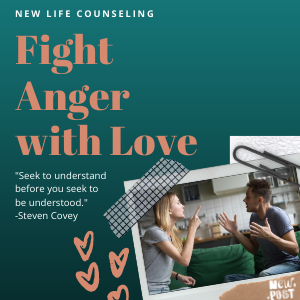Fight Anger with Love
“A gentle answer turns away anger, but a harsh word stirs up wrath.” Proverbs 15:1

Have you ever said something out of anger that you later regretted? Maybe you grew up in a home where angry words and loud responses were the norm. Or maybe you’ve had experiences where you felt embarrassed or hurt by someone’s angry words.
Contrary to the “sticks and stones,” rhyme, words are hurtful and can leave trauma-based scars that change your view of self—especially if they were heard and felt when you were younger.
I know I’ve spent quite a bit of time healing from angry words, have you? How are those same moments still impacting you? Sometimes healing can take years, which is why finding ways to avoid or manage these moments is crucial.
A lot of times, angry words are spewed during a fight. But a fight can only happen when more than one person engages—reciprocating raised voices, yelling, blaming, and name calling. Sure, a single person can start a fight, but it takes at least two to continue.
During a disagreement, or when our spouse/friend chooses angry words, our wounds from our past can trigger an equally mean reaction. It can be hard to respond with love in these moments. Here’s what I want you to remember: Emotions are information about you, not instructions about what to do.
Meaning, if you find yourself feeling worked up, reactive, frustrated, or upset, that’s good! You’re recognizing your feelings and attaching them to a situation. But that doesn’t mean you respond based upon those feelings.
You pause, breathe, and take a moment to decide on an appropriate, respectful response.
It’s always surprising to me when spouses unleash harsh and hurtful words over months and years without recognizing the negative impact they have on the relationship and each other. It’s hard to hear clients curse and call the person they pledged love to cruel names. When I see this, “you reap what you sow” comes to mind. If you sow anger, don’t expect a harvest of love in return.
As the receiving party, you may not like the anger being “sowed,” but my question is this: How does yelling back help solve the problem?
I know it’s difficult not to personalize the cruel words coming your way, especially when they feel so intimate and are said in a harsh tone. And don’t get me wrong, you have a healthy right to be upset and hurt.
But learning to stop the natural urge to defend yourself, strike back, or shut down is a skill all loving adults should learn to build and maintain healthy, respectful relationships. It’s important to learn how to tend to your partner’s needs and figure out what’s causing them to react this way. I find this most difficult when my automatic reactions take over. Sometimes that internal child or adolescent is hard to control.
Having a few responses to turn to can be helpful. Some might be:
“You sound upset. Can you calmly tell me what’s upsetting you?”
“I hear that you’re angry. Can you tell me what you’re upset about?”
“It sounds like there’s more going on here. Can we talk about it?”
These replies tend to their feelings and fears instead of focusing on the emotionally driven words coming out of their mouths.
“Seek to understand before you seek to be understood.” – Steven Covey
If they’re hurting, offer comfort. Seek to connect with empathy and understanding. Respond with kindness and gentleness.
These are the behaviors of a loving adult. Approach anger with a heart of love, and remember your strongest love for this person—even when things feel tough.
